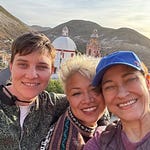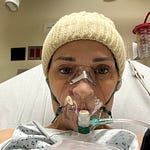The phone rang.
A pharmacist’s voice, gentle but matter-of-fact:
“A prescription has arrived for you. It will take a few days to prepare. When would you like to pick it up?”
I remember the pause.
I remember thinking: This is a prescription that could end my life.
I thanked them.
I told them not to fill it.
I didn’t ask for the prescription because I wanted to die.
I asked for it because I wanted to live—with my agency intact.
To know that if pain ever drowned out my voice, I could still speak—through choice.
Last week, the New York State Senate finally voted to legalize Medical Aid in Dying.
What feels abstract to some
has been the ground I’ve walked for years.
Because when life is measured in months,
what matters isn’t how long—
but how fully you’re still allowed to show up.
Sometimes, just knowing there’s a choice is balm.
A thread of sovereignty in a world that felt like it had spun off its axis.
Medical Aid in Dying isn’t for everyone.
But for those of us living under the shadow of a terminal illness,
it offers something many don’t realize they might want—or need—
until it’s too late to choose.
When I was diagnosed with stage 4 cholangiocarcinoma—a rare and relentless cancer—the words hadn’t even finished echoing before I began gathering what I’d need for the road ahead: an oncologist, a DNR, a will, Power of attorney.
And then there was this--the quietest, most radical thing.
The process was solemn. Deliberate. Humbling.
An oral request. Then a written one.
Two doctors confirming what I already knew:
That my life had been measured in months—
And that my mind, though shaken, was still mine.
There was a waiting period.
There were forms. Witnesses.
And with each signature, I moved deeper into a terrain I’d hoped never to inhabit—
but knew I had to map.
By the time the prescription was sent, I didn’t fill it.
I had just started palliative chemo.
I wasn’t ready to hold that kind of finality in my hands.
But knowing it was there—quietly waiting, tucked away—softened the blade of my fear.
It gave me something I hadn’t realized I needed:
a glimpse of an ending not governed by agony or stripped of dignity.
An exit that wouldn’t unravel the people I love
But would instead honor the way I’ve lived—deliberately, fiercely, awake.
That small slip of paper wasn’t an escape plan.
It was a permission slip.
A quiet invitation to meet death—
not with dread,
but with reverent curiosity.
To see it not as a threat,
but as part of the path.
Soon enough, its work was done.
What I found myself reaching for wasn’t control—
but trust: in the unfolding,
in my body,
in the mystery of how life carries us to its sacred edge.
What changed wasn’t the diagnosis.
It was how related to impermanence.
I stopped bracing. I started listening.
In that surrender, I began to reclaim something deeper than choice.
a way of being with illness, with pain, with impermanence—
that felt spacious.
Grounded.
Whole.
A life not armored against the end, but open to its mystery.
I wasn’t surprised to learn that many who obtain Medical Aid in Dying never use it.
Its promise alone can bring peace.
I hadn’t yet seen The Last Ecstatic Days when this shift was taking place
But when a friend said it reminded her of my path, I watched—
and something in me recognized itself.
The film follows Ethan Sisser, a young man with terminal brain cancer who chose to spend his final days in community—
with music, with ceremony, with unguarded presence.
He danced.
He prayed.
He allowed himself to be fully seen—
not only in his dying,
but in the way he lived it—intentionally, fully, and without retreat.
His death became an offering—
not just for him,
but for everyone who bore witness.
His story reminded me:
agency in dying isn’t really about control.
It’s about connection.
About meaning.
About the tender, radiant possibility
that the final chapter can still be deeply lived.
Medical Aid in Dying doesn’t compel action.
It opens space—
to discern, with conscience, with kin, with spirit—
what compassion looks like at the end.
Let me be clear: I no longer feel the need to use MAID.
But I’ve heard too many stories.
Stories of people with neurodegenerative diseases—
trapped in bodies that no longer serve them,
silenced, stripped of ease and dignity,
suffering in ways no one should have to.
Others endure relentless, incurable pain—
unable to inhabit the life they once cherished,
with the end not a question, but a certainty.
That’s why this option should exist.
So we can meet the end
not with fear—
But with love as our anchor, and choice as our compass.
Like mine, some prescriptions are never filled—
but they do their work all the same.
I don’t share this to persuade.
I share it to offer a light on a path many fear to name.
If you—or someone you love—is walking toward the end,
may you remember this:
Choice isn’t about ending life.
It’s about shaping how we meet it—
with presence,
with compassion,
and with trust in whatever carries us to the edge.
Yesterday, I stood in the streets—
shoulder to shoulder with others still fighting
for a world in which dignity is not a luxury.
In a time of so much suffering,
this is what I can offer:
a truth lived,
a hand extended,
a future imagined.
And you?
What have you learned—about life, or death—when choice was present?
Or when it was absent?










Share this post